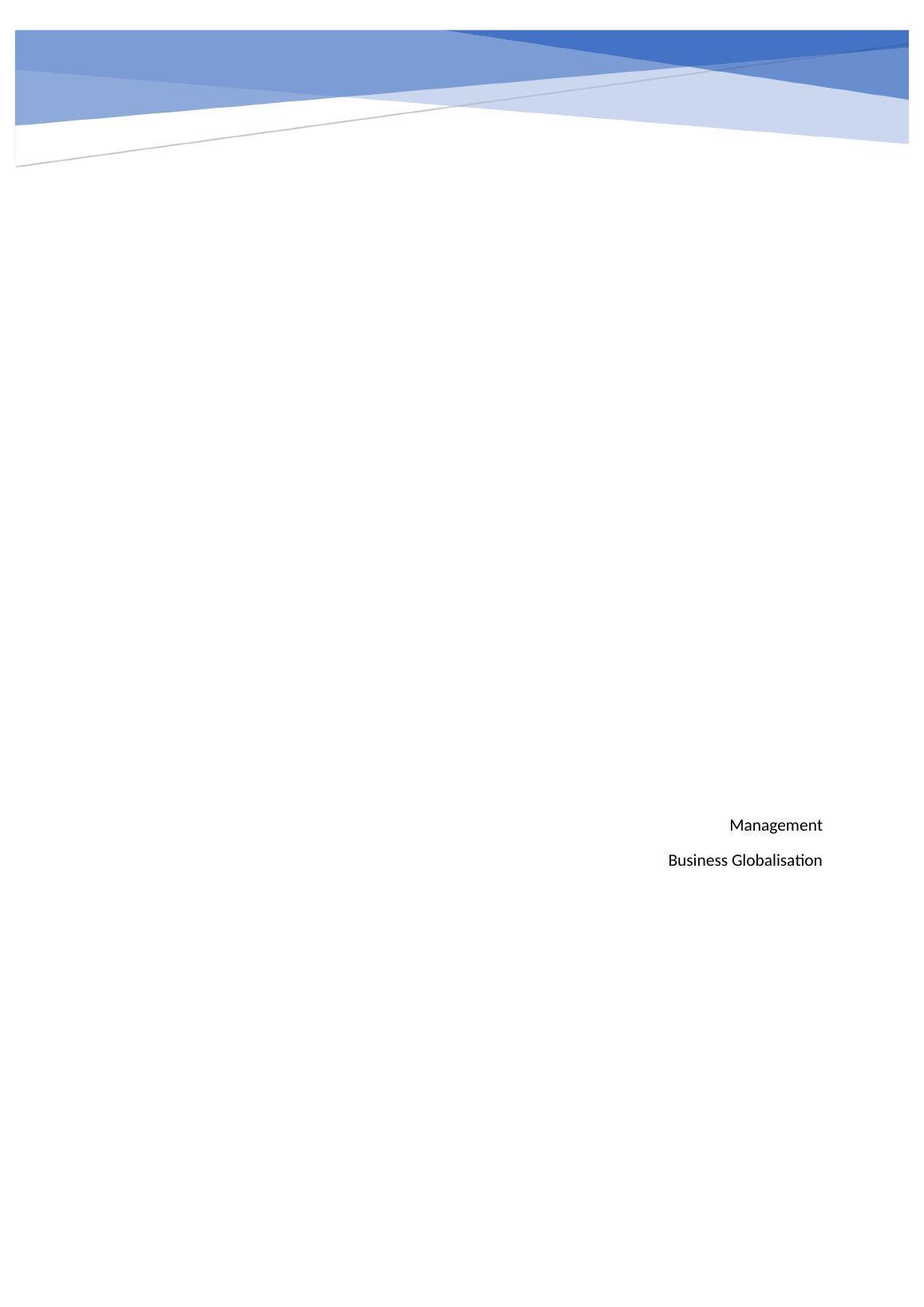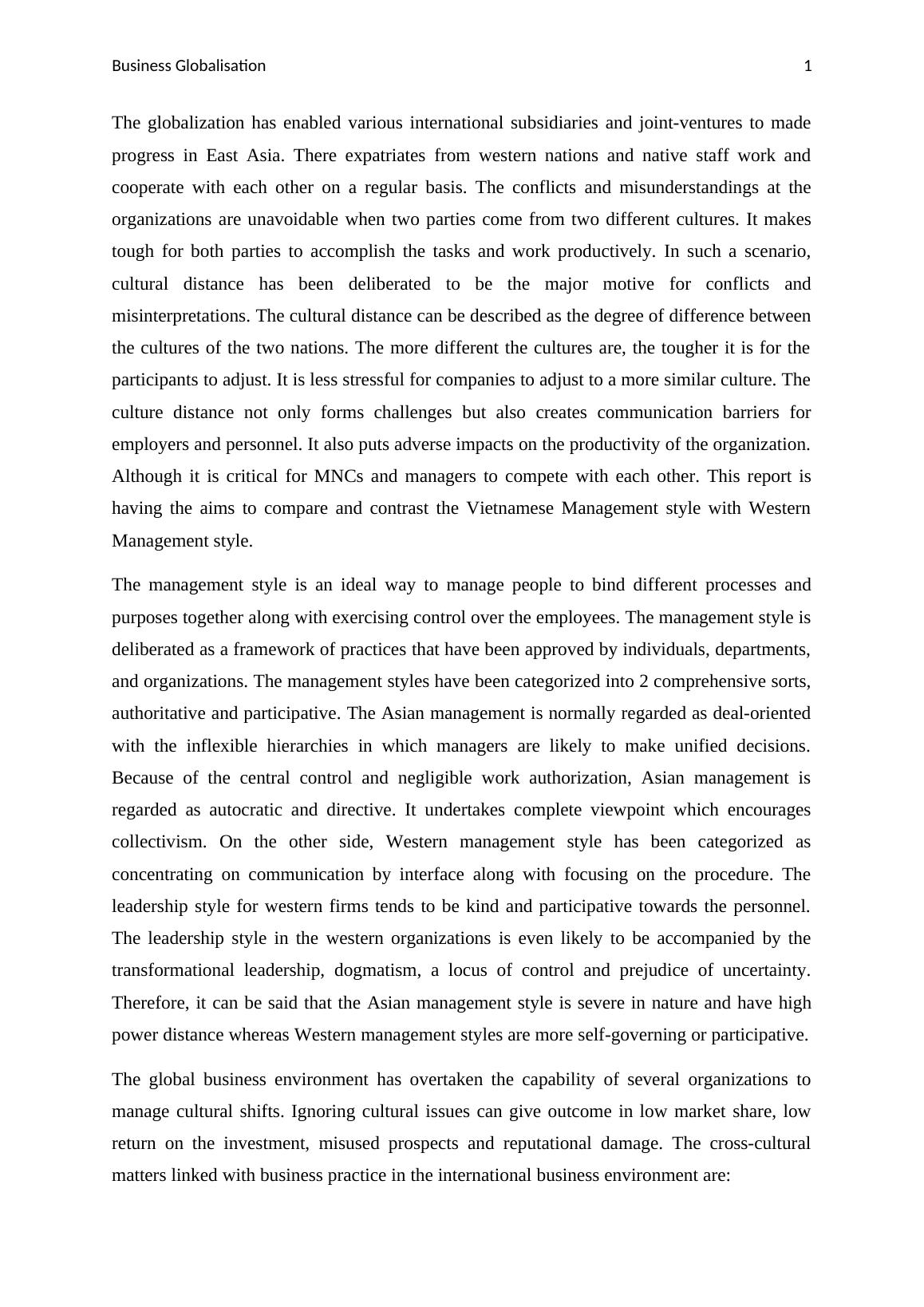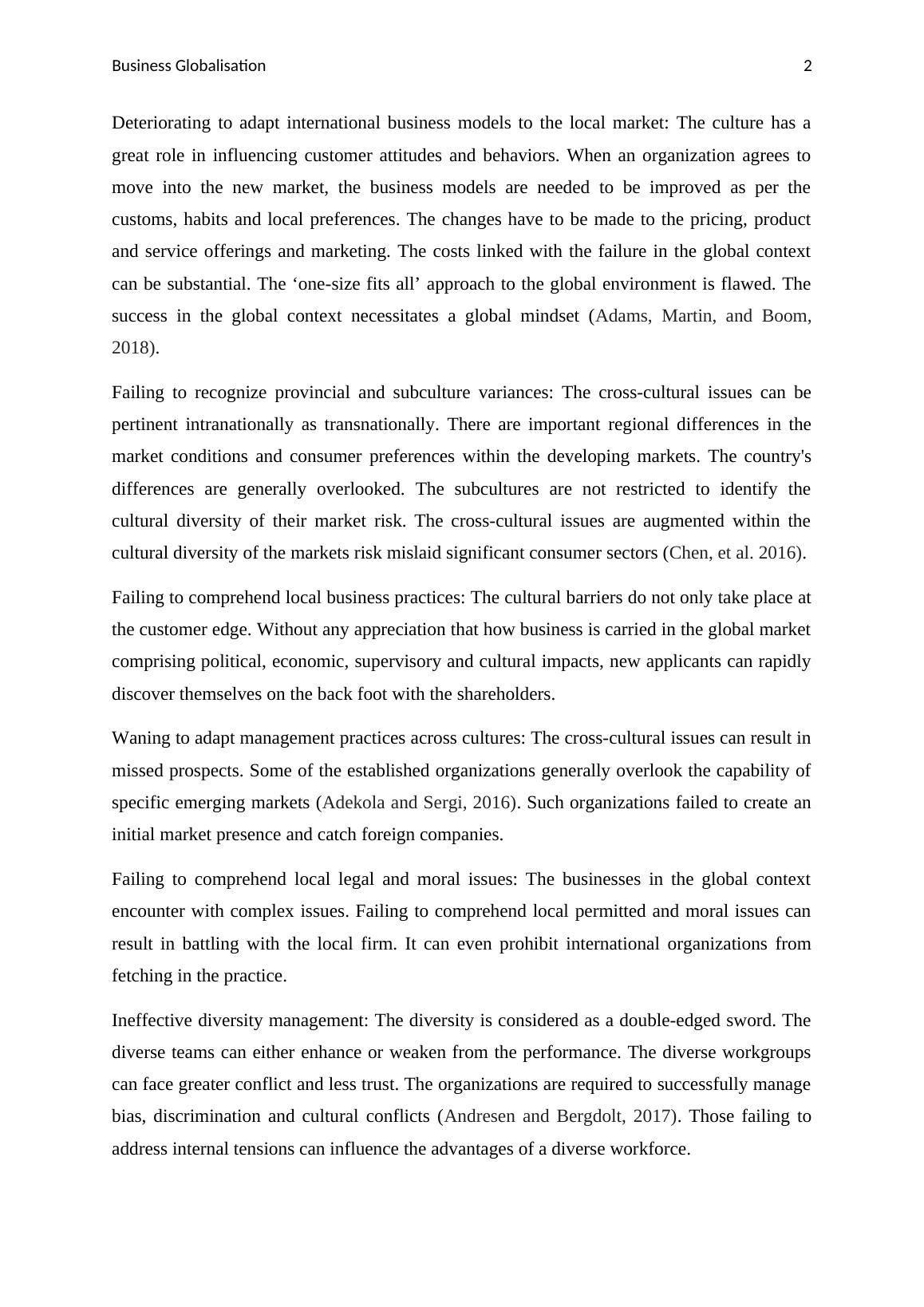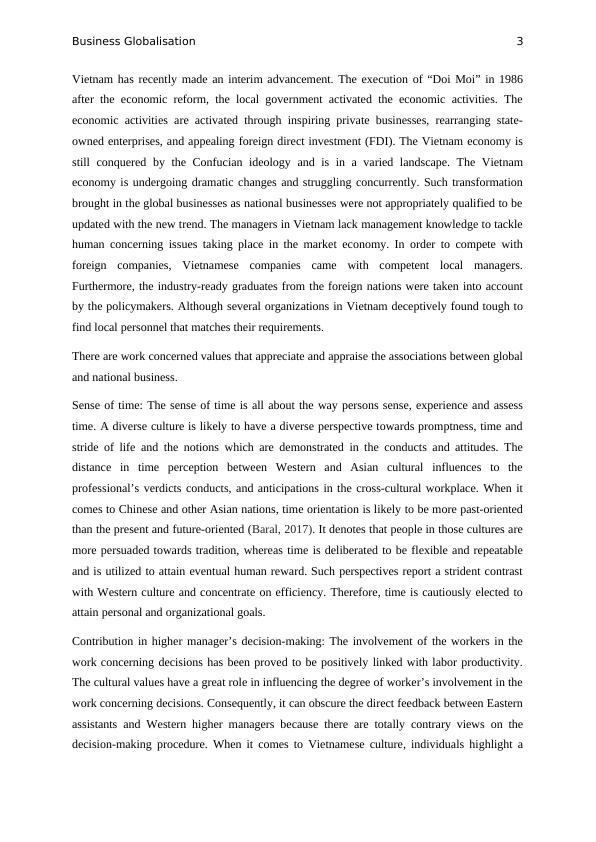Assignment on Management - Business Globalisation
Select one of the provided questions/statements and write an analytical essay discussing the topic in relation to Vietnam.
14 Pages5000 Words11 Views
Added on 2022-08-22
Assignment on Management - Business Globalisation
Select one of the provided questions/statements and write an analytical essay discussing the topic in relation to Vietnam.
Added on 2022-08-22
ShareRelated Documents
MANAGEMENT
Business Globalisation
Business Globalisation

Business Globalisation 1
The globalization has enabled various international subsidiaries and joint-ventures to made
progress in East Asia. There expatriates from western nations and native staff work and
cooperate with each other on a regular basis. The conflicts and misunderstandings at the
organizations are unavoidable when two parties come from two different cultures. It makes
tough for both parties to accomplish the tasks and work productively. In such a scenario,
cultural distance has been deliberated to be the major motive for conflicts and
misinterpretations. The cultural distance can be described as the degree of difference between
the cultures of the two nations. The more different the cultures are, the tougher it is for the
participants to adjust. It is less stressful for companies to adjust to a more similar culture. The
culture distance not only forms challenges but also creates communication barriers for
employers and personnel. It also puts adverse impacts on the productivity of the organization.
Although it is critical for MNCs and managers to compete with each other. This report is
having the aims to compare and contrast the Vietnamese Management style with Western
Management style.
The management style is an ideal way to manage people to bind different processes and
purposes together along with exercising control over the employees. The management style is
deliberated as a framework of practices that have been approved by individuals, departments,
and organizations. The management styles have been categorized into 2 comprehensive sorts,
authoritative and participative. The Asian management is normally regarded as deal-oriented
with the inflexible hierarchies in which managers are likely to make unified decisions.
Because of the central control and negligible work authorization, Asian management is
regarded as autocratic and directive. It undertakes complete viewpoint which encourages
collectivism. On the other side, Western management style has been categorized as
concentrating on communication by interface along with focusing on the procedure. The
leadership style for western firms tends to be kind and participative towards the personnel.
The leadership style in the western organizations is even likely to be accompanied by the
transformational leadership, dogmatism, a locus of control and prejudice of uncertainty.
Therefore, it can be said that the Asian management style is severe in nature and have high
power distance whereas Western management styles are more self-governing or participative.
The global business environment has overtaken the capability of several organizations to
manage cultural shifts. Ignoring cultural issues can give outcome in low market share, low
return on the investment, misused prospects and reputational damage. The cross-cultural
matters linked with business practice in the international business environment are:
The globalization has enabled various international subsidiaries and joint-ventures to made
progress in East Asia. There expatriates from western nations and native staff work and
cooperate with each other on a regular basis. The conflicts and misunderstandings at the
organizations are unavoidable when two parties come from two different cultures. It makes
tough for both parties to accomplish the tasks and work productively. In such a scenario,
cultural distance has been deliberated to be the major motive for conflicts and
misinterpretations. The cultural distance can be described as the degree of difference between
the cultures of the two nations. The more different the cultures are, the tougher it is for the
participants to adjust. It is less stressful for companies to adjust to a more similar culture. The
culture distance not only forms challenges but also creates communication barriers for
employers and personnel. It also puts adverse impacts on the productivity of the organization.
Although it is critical for MNCs and managers to compete with each other. This report is
having the aims to compare and contrast the Vietnamese Management style with Western
Management style.
The management style is an ideal way to manage people to bind different processes and
purposes together along with exercising control over the employees. The management style is
deliberated as a framework of practices that have been approved by individuals, departments,
and organizations. The management styles have been categorized into 2 comprehensive sorts,
authoritative and participative. The Asian management is normally regarded as deal-oriented
with the inflexible hierarchies in which managers are likely to make unified decisions.
Because of the central control and negligible work authorization, Asian management is
regarded as autocratic and directive. It undertakes complete viewpoint which encourages
collectivism. On the other side, Western management style has been categorized as
concentrating on communication by interface along with focusing on the procedure. The
leadership style for western firms tends to be kind and participative towards the personnel.
The leadership style in the western organizations is even likely to be accompanied by the
transformational leadership, dogmatism, a locus of control and prejudice of uncertainty.
Therefore, it can be said that the Asian management style is severe in nature and have high
power distance whereas Western management styles are more self-governing or participative.
The global business environment has overtaken the capability of several organizations to
manage cultural shifts. Ignoring cultural issues can give outcome in low market share, low
return on the investment, misused prospects and reputational damage. The cross-cultural
matters linked with business practice in the international business environment are:

Business Globalisation 2
Deteriorating to adapt international business models to the local market: The culture has a
great role in influencing customer attitudes and behaviors. When an organization agrees to
move into the new market, the business models are needed to be improved as per the
customs, habits and local preferences. The changes have to be made to the pricing, product
and service offerings and marketing. The costs linked with the failure in the global context
can be substantial. The ‘one-size fits all’ approach to the global environment is flawed. The
success in the global context necessitates a global mindset (Adams, Martin, and Boom,
2018).
Failing to recognize provincial and subculture variances: The cross-cultural issues can be
pertinent intranationally as transnationally. There are important regional differences in the
market conditions and consumer preferences within the developing markets. The country's
differences are generally overlooked. The subcultures are not restricted to identify the
cultural diversity of their market risk. The cross-cultural issues are augmented within the
cultural diversity of the markets risk mislaid significant consumer sectors (Chen, et al. 2016).
Failing to comprehend local business practices: The cultural barriers do not only take place at
the customer edge. Without any appreciation that how business is carried in the global market
comprising political, economic, supervisory and cultural impacts, new applicants can rapidly
discover themselves on the back foot with the shareholders.
Waning to adapt management practices across cultures: The cross-cultural issues can result in
missed prospects. Some of the established organizations generally overlook the capability of
specific emerging markets (Adekola and Sergi, 2016). Such organizations failed to create an
initial market presence and catch foreign companies.
Failing to comprehend local legal and moral issues: The businesses in the global context
encounter with complex issues. Failing to comprehend local permitted and moral issues can
result in battling with the local firm. It can even prohibit international organizations from
fetching in the practice.
Ineffective diversity management: The diversity is considered as a double-edged sword. The
diverse teams can either enhance or weaken from the performance. The diverse workgroups
can face greater conflict and less trust. The organizations are required to successfully manage
bias, discrimination and cultural conflicts (Andresen and Bergdolt, 2017). Those failing to
address internal tensions can influence the advantages of a diverse workforce.
Deteriorating to adapt international business models to the local market: The culture has a
great role in influencing customer attitudes and behaviors. When an organization agrees to
move into the new market, the business models are needed to be improved as per the
customs, habits and local preferences. The changes have to be made to the pricing, product
and service offerings and marketing. The costs linked with the failure in the global context
can be substantial. The ‘one-size fits all’ approach to the global environment is flawed. The
success in the global context necessitates a global mindset (Adams, Martin, and Boom,
2018).
Failing to recognize provincial and subculture variances: The cross-cultural issues can be
pertinent intranationally as transnationally. There are important regional differences in the
market conditions and consumer preferences within the developing markets. The country's
differences are generally overlooked. The subcultures are not restricted to identify the
cultural diversity of their market risk. The cross-cultural issues are augmented within the
cultural diversity of the markets risk mislaid significant consumer sectors (Chen, et al. 2016).
Failing to comprehend local business practices: The cultural barriers do not only take place at
the customer edge. Without any appreciation that how business is carried in the global market
comprising political, economic, supervisory and cultural impacts, new applicants can rapidly
discover themselves on the back foot with the shareholders.
Waning to adapt management practices across cultures: The cross-cultural issues can result in
missed prospects. Some of the established organizations generally overlook the capability of
specific emerging markets (Adekola and Sergi, 2016). Such organizations failed to create an
initial market presence and catch foreign companies.
Failing to comprehend local legal and moral issues: The businesses in the global context
encounter with complex issues. Failing to comprehend local permitted and moral issues can
result in battling with the local firm. It can even prohibit international organizations from
fetching in the practice.
Ineffective diversity management: The diversity is considered as a double-edged sword. The
diverse teams can either enhance or weaken from the performance. The diverse workgroups
can face greater conflict and less trust. The organizations are required to successfully manage
bias, discrimination and cultural conflicts (Andresen and Bergdolt, 2017). Those failing to
address internal tensions can influence the advantages of a diverse workforce.

Business Globalisation 3
Vietnam has recently made an interim advancement. The execution of “Doi Moi” in 1986
after the economic reform, the local government activated the economic activities. The
economic activities are activated through inspiring private businesses, rearranging state-
owned enterprises, and appealing foreign direct investment (FDI). The Vietnam economy is
still conquered by the Confucian ideology and is in a varied landscape. The Vietnam
economy is undergoing dramatic changes and struggling concurrently. Such transformation
brought in the global businesses as national businesses were not appropriately qualified to be
updated with the new trend. The managers in Vietnam lack management knowledge to tackle
human concerning issues taking place in the market economy. In order to compete with
foreign companies, Vietnamese companies came with competent local managers.
Furthermore, the industry-ready graduates from the foreign nations were taken into account
by the policymakers. Although several organizations in Vietnam deceptively found tough to
find local personnel that matches their requirements.
There are work concerned values that appreciate and appraise the associations between global
and national business.
Sense of time: The sense of time is all about the way persons sense, experience and assess
time. A diverse culture is likely to have a diverse perspective towards promptness, time and
stride of life and the notions which are demonstrated in the conducts and attitudes. The
distance in time perception between Western and Asian cultural influences to the
professional’s verdicts conducts, and anticipations in the cross-cultural workplace. When it
comes to Chinese and other Asian nations, time orientation is likely to be more past-oriented
than the present and future-oriented (Baral, 2017). It denotes that people in those cultures are
more persuaded towards tradition, whereas time is deliberated to be flexible and repeatable
and is utilized to attain eventual human reward. Such perspectives report a strident contrast
with Western culture and concentrate on efficiency. Therefore, time is cautiously elected to
attain personal and organizational goals.
Contribution in higher manager’s decision-making: The involvement of the workers in the
work concerning decisions has been proved to be positively linked with labor productivity.
The cultural values have a great role in influencing the degree of worker’s involvement in the
work concerning decisions. Consequently, it can obscure the direct feedback between Eastern
assistants and Western higher managers because there are totally contrary views on the
decision-making procedure. When it comes to Vietnamese culture, individuals highlight a
Vietnam has recently made an interim advancement. The execution of “Doi Moi” in 1986
after the economic reform, the local government activated the economic activities. The
economic activities are activated through inspiring private businesses, rearranging state-
owned enterprises, and appealing foreign direct investment (FDI). The Vietnam economy is
still conquered by the Confucian ideology and is in a varied landscape. The Vietnam
economy is undergoing dramatic changes and struggling concurrently. Such transformation
brought in the global businesses as national businesses were not appropriately qualified to be
updated with the new trend. The managers in Vietnam lack management knowledge to tackle
human concerning issues taking place in the market economy. In order to compete with
foreign companies, Vietnamese companies came with competent local managers.
Furthermore, the industry-ready graduates from the foreign nations were taken into account
by the policymakers. Although several organizations in Vietnam deceptively found tough to
find local personnel that matches their requirements.
There are work concerned values that appreciate and appraise the associations between global
and national business.
Sense of time: The sense of time is all about the way persons sense, experience and assess
time. A diverse culture is likely to have a diverse perspective towards promptness, time and
stride of life and the notions which are demonstrated in the conducts and attitudes. The
distance in time perception between Western and Asian cultural influences to the
professional’s verdicts conducts, and anticipations in the cross-cultural workplace. When it
comes to Chinese and other Asian nations, time orientation is likely to be more past-oriented
than the present and future-oriented (Baral, 2017). It denotes that people in those cultures are
more persuaded towards tradition, whereas time is deliberated to be flexible and repeatable
and is utilized to attain eventual human reward. Such perspectives report a strident contrast
with Western culture and concentrate on efficiency. Therefore, time is cautiously elected to
attain personal and organizational goals.
Contribution in higher manager’s decision-making: The involvement of the workers in the
work concerning decisions has been proved to be positively linked with labor productivity.
The cultural values have a great role in influencing the degree of worker’s involvement in the
work concerning decisions. Consequently, it can obscure the direct feedback between Eastern
assistants and Western higher managers because there are totally contrary views on the
decision-making procedure. When it comes to Vietnamese culture, individuals highlight a

End of preview
Want to access all the pages? Upload your documents or become a member.
Related Documents
Differences in Leadership between ‘Western’ and ‘Confucian Asian’ Companieslg...
|6
|1035
|164
Managing in International Context - Article Reviewlg...
|4
|821
|31
Cross Culture Studies Assignment PDFlg...
|11
|2803
|35
Analysis of Global Leadership Competencieslg...
|9
|2103
|144
Strategies in International Hotelslg...
|8
|2144
|390
Conflict Managementlg...
|9
|2251
|1
